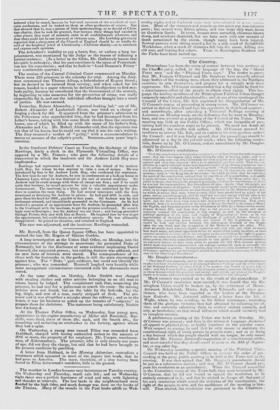In the Insolvent Debtors' Court on Tuesday, the discharge of
John Rawlings, lately a clerk in the Plymouth Victualling Office, was opposed by a Mr. Francis ; who gave the following details of a transaction in which the insolvent and Sir Andrew Leith Hay were implicated— Rawlings had represented himself to him as the friend of Sir Andrew Leith Hay, for whom he was anxious to raise a sum of money. He was introduced by him to Sir Andrew Leith Hay, who confirmed the statement. The first time he saw Sir Andrew, he was in confinement at a lock.up house in Chancery Lane, where he was detained at the suit of several creditors. Sir Andrew said he could arrange with them all except one firm ; and if he could settle that business, he would procure for him a valuable appointment under Government. The insolvent, in a letter, said he was authorized by Sir An- drew to mention the same thing. He had several interviews with the firm mentioned as detaining Sir Andrew in prison: he had paid 4001. in cash, and gave them his bond for SOU, payable in four years. Sir Andrew was by this settlement released, and immediately proceeded to the Continent. As he had received a promise of an appoinment from Sir Andrew, he proceeded after him to the Continent with the insolvent, to get the promise confirmed. He accord- ingly went to Boulogne ; but Sir Andrew was not there ; and having proceeded through France, they met with him at Rouen. He inquired how he was to get the appointment, but could obtain no satisfactory answer. He was ultimately disappointed : he gained no situation, and returned to England.
The case was adjourned, and the insolvent Rawlings remanded.


























 Previous page
Previous page